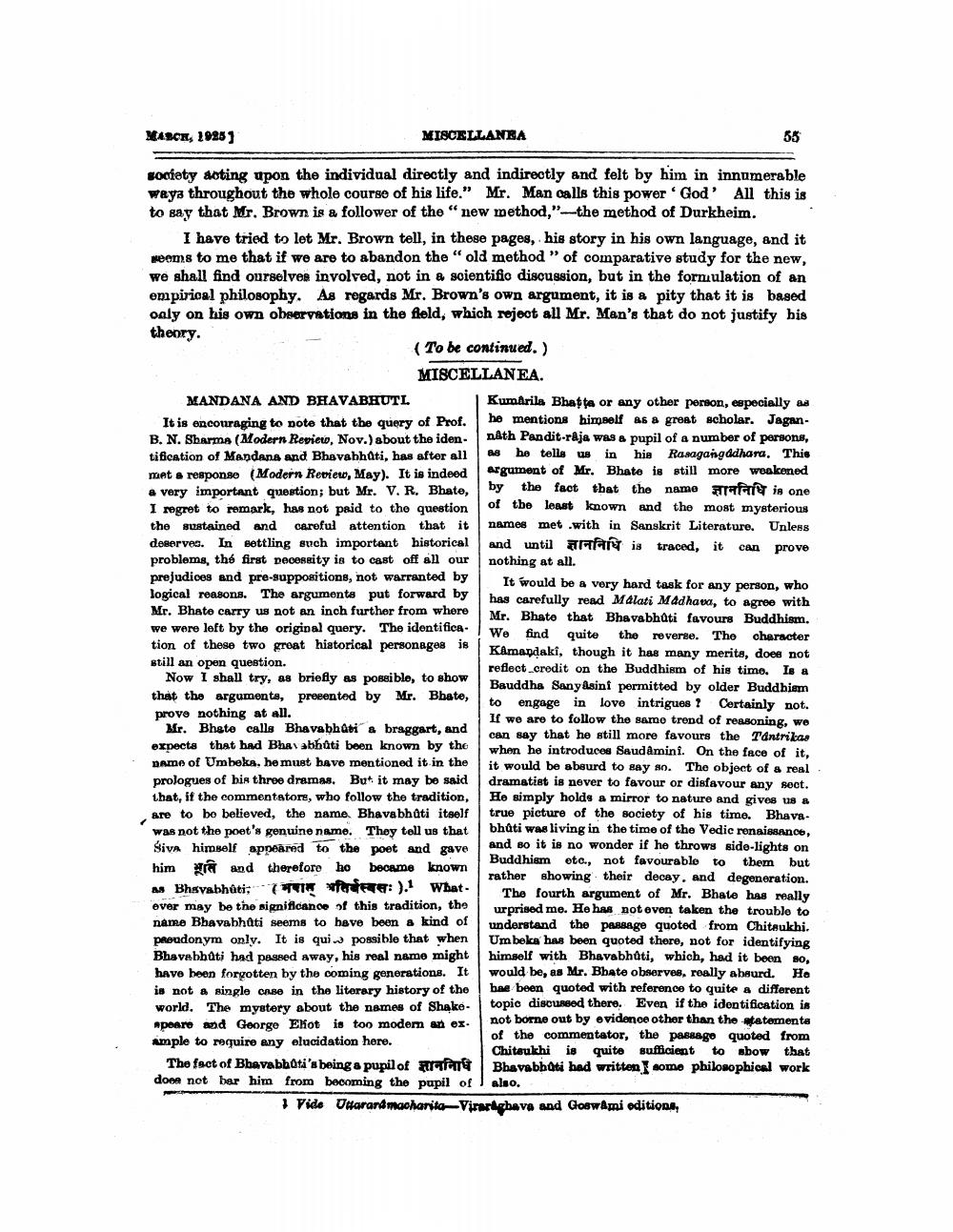________________
MASCH, 1925)
MISCELLANEA
55
society acting upon the individual directly and indirectly and felt by him in innumerable ways throughout the whole course of his life." Mr. Man calls this power 'God' All this is to say that Mr. Brown is a follower of the " new method," the method of Durkheim.
I have tried to let Mr. Brown tell, in these pages, his story in his own language, and it veems to me that if we are to abandon the “old method ” of comparative study for the new, we shall find ourselves involved, not in a scientifio discussion, but in the forniulation of an empirical philosophy. As regards Mr. Brown's own argument, it is a pity that it is based only on his own observations in the field, which reject all Mr. Man's that do not justify bis theory.
(To be continued.)
MISCELLANEA. MANDANA AND BHAVABHUTL
Kumarila Bhatta or any other person, especially a It is encouraging to note that the query of Prof. | he mentions himself as a great scholar. JaganB. N. Sharma (Modern Review, Nov.) about the iden- nath Pandit-raja was a pupil of a number of persons, tification of Mandana and Bhavabhati, has after all as he tells us in his Rasagangadhara. This mat s response (Modern Review, May). It is indeed argument of Mr. Bhate is still more weakened a very important question; but Mr. V. R. Bhate, by the fact that the name afar is one I regret to remark, has not paid to the question
of the least known and the most mysterious the sustained and careful attention that it names met with in Sanskrit Literature. Unless deserves. In settling such important historical and until mar is traced, it can prove problems, the first pecessity is to cast off all our nothing at all. prejudices and pre-suppositions, not warranted by
It would be a very hard task for any person, who logical reasons. The arguments put forward by
has carefully read Malati Madhava, to agree with Mr. Bhato carry us not an inch further from where
Mr. Bhate that Bhavabhūti favours Buddhism. we were left by the original query. The identifica.
We find quite the reverse. The character tion of these two great historical personages is
Kamandaki, though it has many merite, does not still an open question.
reflect.credit on the Buddhism of his timo. Is a Now I shall try, as briefly as possible, to show
Bauddha Sanyasini permitted by older Buddhiem that the arguments, presented by Mr. Bhate,
to engage in love intrigues ? Certainly not. prove nothing at all.
If we are to follow the samo trend of reasoning, we Mr. Bhste calls Bhavabhati & braggart, and
can say that he still more favours the Tantrikas expects that had Bhavabhûti been known by the
when he introduces Saudamini. On the face of it, DAMA of Umbeks, he must have mentioned it in the it would be absurd to say so. The object of a real prologues of his three dramas. But it may be said dramatist is never to favour or disfavour any sect. that, it the commentatore, who follow the tradition, Ho simply holds a mirror to nature and gives 18 a are to be believed, the name. Bhavabhūti itself true picture of the society of his time. Bhavawas not the poet's genuine name. They tell us that bhàti was living in the time of the Vedic renaissance, Siva himself appeared to the poet and gave
and so it is no wonder if he throws side-lights on
Buddhism etc., not favourable to them but him and therefore he became known
rather showing their decay. and degeneration. as Bhavabhâti: (TIK BETE: ). What.
The fourth argument of Mr. Bhate has really ever may be the significance of this tradition, the urprised me. He has not oven taken the trouble to name Bhavabhäti seems to beve been a kind of understand the passage quoted from Chitaukhi. proudonym only. It is qui possible that when Umbeks has been quoted there, not for identifying Bhavabhati had passed away, his real name might himself with Bhavabhậti, which, had it been so, have been forgotten by the coming generations. It would be, as Mr. Bhate observes, really absurd. He is not a single case in the literary history of the hne been quoted with reference to quite a different world. The mystery about the names of Shake topic discussed there. Even if the identification is peare and George Ekot is too modern an ex.
not borne out by evidence other than the statementa
of the commentator, the passage quoted from ample to require any elucidation here.
Chiteukhi is quite sufficient to sbow that The fact of Bhavabhta's being a pupil of Arafa Bhavabhati had written some philosophical work donn not bar him from becoming the pupil of I also
1 Vide Ouarand macharita Viraraghava and Goswami odition,




